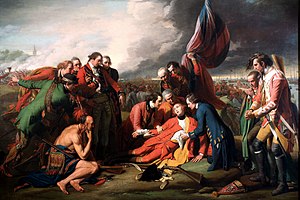Seven Years' War
The Seven Years' War lasted from 1756 to 1763 and involved most of the great powers in Europe. At first, the war was made up of two conflicts.[1] The first one was mainly between Britain and France,[1] and the other was between Prussia and its enemies: France, Austria, Russia, and Sweden.[1]

An important cause of the war was the War of the Austrian Succession.[2]
The war was known by different names in different places. In the United States, it is known as the French and Indian War.[3] In French Canada, it is known as the War Of Conquest.[4] In both Sweden and Prussia, it was known as the Pomeranian War because they were fighting over Pomerania.[4] In India, it is known as the Third Carnatic War.[4]
As for the conflict between Prussia and Austria, it is known as the Third Silesian War.[4]
Colonialism was common at the time. During the war, the trade interests of the British Empire were opposed to those of the Bourbons, who controlled France and Spain. The Hohenzollerns, who ruled Prussia, and the Habsburgs, who were Holy Roman Emperors and archdukes in Austria, fought each other, mainly over Silesia.
A "diplomatic revolution" established an Anglo-Prussian camp, which was allied with some smaller German states and later the Portuguese Empire. It fought an Austro-French camp, which was allied with Sweden, Saxony and later Spain.
Results
changeThe Russian Empire left its offensive alliance with the Habsburgs when Empress Elizabeth died and her nephew Peter III became Tsar. Sweden also concluded a separate peace with Prussia in 1762.
The war ended with the Treaties of Paris (France, Spain, Great Britain) and of Hubertusburg (Hohenzollerns, Habsburgs, Saxon elector) in 1763. The war had been characterized by sieges and arson of towns as well as open battles involving extremely heavy losses. Overall, some 900,000 to 1,400,000 people died.
Great Britain succeeded in the contested overseas territories by gaining the bulk of New France, Spanish Florida, some Caribbean islands and Senegal and superiority over the French outposts on the Indian subcontinent. The Native American tribes were excluded from the peace settlement, and were unable to return to their former status after the resulting Pontiac's rebellion.
In Europe, Frederick II of Prussia failed to complete a preemptive strike against Austria, and his opponents repulsed and at Kunersdorf nearly destroyed his forces. Frederick, however recovered, regained ground and managed to avoid any concessions in Hubertusburg, where the status quo ante bellum was restored. William Pitt's said, "America was won in Germany". He referred to the Prussian war effort, which enabled Britain to limit its continental commitments and to focus on her "blue water policy," successfully establishing naval supremacy. While French and allied forces were able to occupy Prussian and Hanoverian territories up to East Frisia, French ambitions to invade Britain and to continue with their commerce raiding were thwarted by a British naval blockade, which impaired French supply routes to the colonies.
The involvement of Portugal, Spain and Sweden did not return them to their former status as great powers. Spain's short intervention resulted in the loss of Florida, but gained French Louisiana west of the Mississippi River in exchange. Also, Britain returned Cuba and the Philippines.
The Treaty of Paris in 1763 ended the war for Britain and France.
References
change- ↑ 1.0 1.1 1.2 "Seven Years' War". History. A&E Television Networks, LLC. Retrieved January 12, 2017.
- ↑ Ted Brackemyre. "The American Revolution; A Very European Ordeal". U.S. History Scene. Retrieved January 12, 2017.
- ↑ Bamber Gascoigne. "Seven Years' War". HistoryWorld. Retrieved January 12, 2017.
- ↑ 4.0 4.1 4.2 4.3 Sam Ralph; Megan Wright. "The Seven Years War: the First World War In 1754". New Histories. Archived from the original on October 28, 2016. Retrieved January 12, 2017.
{{cite web}}: CS1 maint: multiple names: authors list (link)